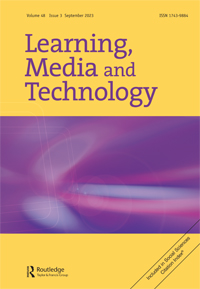Learning in and about a filtered universe: young people’s awareness and control of algorithms in social media
IF 3.1
1区 教育学
Q1 EDUCATION & EDUCATIONAL RESEARCH
引用次数: 1
Abstract
ABSTRACT Whereas ‘Web 2.0 technology’ has pushed the learning agenda towards connectivity and boundary crossing, in the current ‘new new media ontology’ the fear that algorithms might block our avenues to knowledge and connections prevails. In response to this, media scholars have argued that knowledge based on the algorithmic experiences of users is key to reformulating the agenda of critical media education. In this study of the algorithmic experiences of secondary education students in the Netherlands, we want to contribute to building such knowledge, making use of the concepts of algorithmic imagination, power and critical evaluation. Results show students build situational, practical-experiential knowledge of algorithmic workings that is closely in line with the features of the interface of the social media platforms they use. Implications for media literacy include providing students with system-level awareness and agency, including insights into the societal-political consequences of algorithmic workings.在一个被过滤的宇宙中学习:年轻人对社交媒体算法的意识和控制
虽然“Web 2.0技术”将学习议程推向了连接和边界跨越,但在当前的“新新媒体本体”中,人们担心算法可能会阻碍我们获取知识和联系的途径。针对这一点,媒体学者认为,基于用户算法经验的知识是重新制定批判性媒体教育议程的关键。在这项对荷兰中等教育学生算法经验的研究中,我们希望利用算法想象力、力量和批判性评估的概念,为建立这样的知识做出贡献。结果显示,学生们构建的算法工作情境、实践经验知识与他们使用的社交媒体平台的界面特征密切相关。媒体素养的含义包括为学生提供系统级的意识和代理,包括对算法工作的社会政治后果的见解。
本文章由计算机程序翻译,如有差异,请以英文原文为准。
求助全文
约1分钟内获得全文
求助全文
来源期刊

Learning Media and Technology
EDUCATION & EDUCATIONAL RESEARCH-
CiteScore
11.40
自引率
14.50%
发文量
53
期刊介绍:
Learning, Media and Technology aims to stimulate debate on digital media, digital technology and digital cultures in education. The journal seeks to include submissions that take a critical approach towards all aspects of education and learning, digital media and digital technology - primarily from the perspective of the social sciences, humanities and arts. The journal has a long heritage in the areas of media education, media and cultural studies, film and television, communications studies, design studies and general education studies. As such, Learning, Media and Technology is not a generic ‘Ed Tech’ journal. We are not looking to publish context-free studies of individual technologies in individual institutional settings, ‘how-to’ guides for the practical use of technologies in the classroom, or speculation on the future potential of technology in education. Instead we invite submissions which build on contemporary debates such as: -The ways in which digital media interact with learning environments, educational institutions and educational cultures -The changing nature of knowledge, learning and pedagogy in the digital age -Digital media production, consumption and creativity in educational contexts -How digital media are shaping (and being shaped by) educational practices in local, national and global contexts -The social, cultural, economic and political nature of educational media and technology -The ways in which digital media in education interact with issues of democracy and equity, social justice and public good. Learning, Media and Technology analyses such questions from a global, interdisciplinary perspective in contributions of the very highest quality from scholars and practitioners in the social sciences, communication and media studies, cultural studies, philosophy, history as well as in the information and computer sciences.
 求助内容:
求助内容: 应助结果提醒方式:
应助结果提醒方式:


